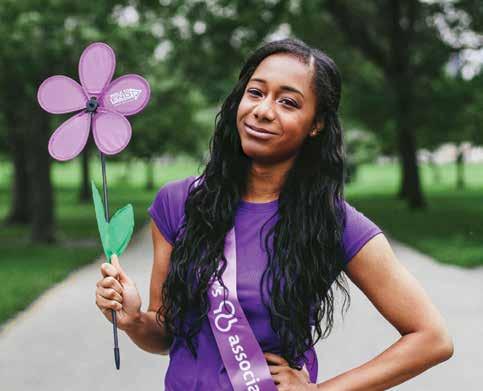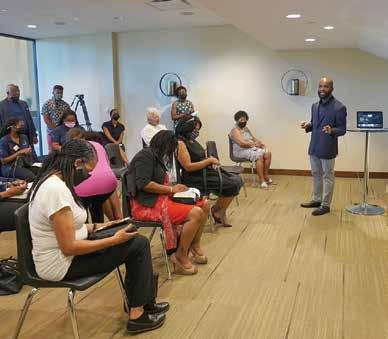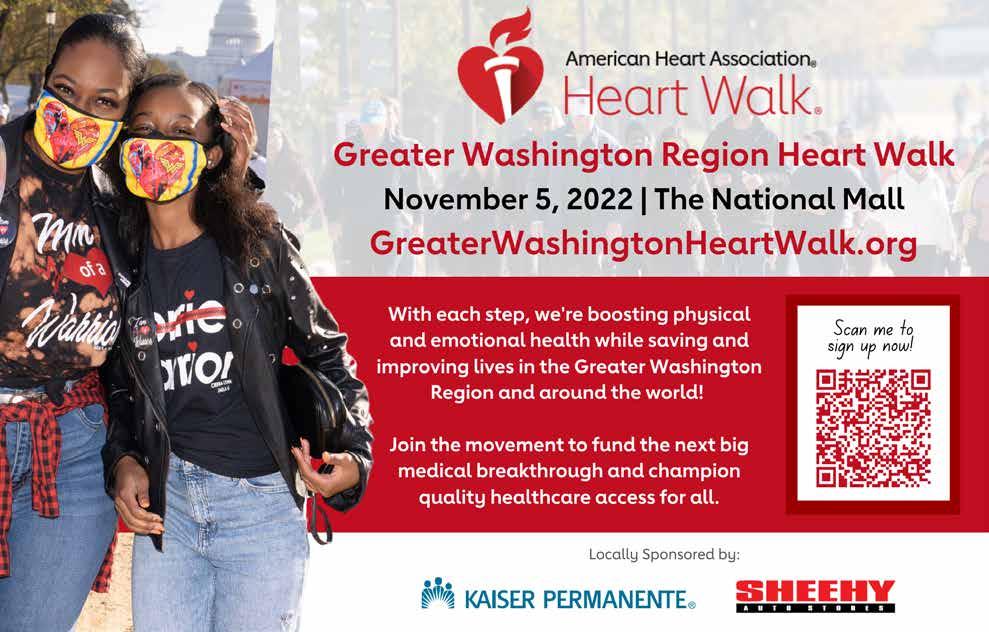
5 minute read
National
D.C. and Maryland Among Locations with Lowest Prevalence of Mental Illness; Greater Access to Care
Stacy M. Brown WI Senior Writer
The District of Columbia counts among the top 10 states with the best mental health, or the combination of the lowest prevalence of mental illness and greater access to
Researchers added that eleven percent of adults with a mental illness are uninsured, and 1 in 10 youth with private insurance do not have coverage for mental health treatments. “Our country has a known shortage of mental health providers – one provider for every 350 individuals – and barriers such as lack of insurance or insurance not covering enough of the cost of mental health care compound the lack of access for those needing help, with clear geographic and racial disparities,” said Maddy Reinert, senior director of population health at MHA.
“We cannot expect mental health to improve in the U.S. if individuals in need are unable to access the kinds of care that they want.”
In an effort for more mental health support, D.C. council member Robert White introduced the District’s Pathways to Behavioral Health Degrees Act of 2022, which would allow students to pursue a master’s degree in social work free of charge at the University of the District of Columbia.
White’s bill, which has eight co-sponsors on the 13-member council, would allow eligible applicants with bachelor’s degrees to obtain scholarships that cover tuition and books. It also provides students with a monthly stipend to cover living expenses and transportation.
“When the pandemic started, I heard from so many people who felt like they needed mental health professionals, and they couldn’t find it, and what we realized is that we have a pipeline problem,” White stated.
In releasing its annual report, MHA said it aims to provide a snapshot of mental health among youth and adults for policy and program planning, analysis, and evaluation.
Further, officials want to track changes in the prevalence of mental health issues and access to mental health care, understand how changes in national data reflect the impact of legislation and policies, and increase dialogue with and improve outcomes for individuals and families with mental health needs.
“Everyone deserves access to the care they need and the opportunity to live a flourishing life of recovery,” Stribling insisted.
WI
care, according to Mental Health America’s annual State of Mental Health in America report.
Wisconsin, Pennsylvania, Massachusetts, Delaware, Connecticut, New Jersey, New York, Illinois, and Maryland round out the top 10.
The states at the lower end of the ranking have higher prevalence rates and less access to care. Those states include Kansas, Indiana, Texas, Oregon, Arizona, Idaho, and Nevada
“This year, again, the evidence is clear regarding the urgent crisis we face in American mental health,” Schroeder Stribling, president and CEO of MHA said in a statement.
“From high numbers of our youth who are contemplating suicide to an increase in substance use, to widespread difficulty in accessing the care they seek, Americans are experiencing high rates of distress and frequent challenges in getting help,” Stribling noted.
Stribling pledged that Mental Health America has continued to work to address and reverse the numbers, including advocating for improvements to policy and practice that reach people where they are – at the right time, with the right help.
“Everyone deserves access to the care they need and the opportunity to live a flourishing life of recovery,” Stribling asserted.
MHA found that 55% of the over 50 million Americans experiencing a mental illness received no treatment, with access and cost as the primary reasons.
Most of those who indicated they could not access needed mental health treatment reported that they could not afford care, MHA researchers found.
This reason was followed by not knowing where to get services, thinking they could handle their mental health without treatment, not having time, or health insurance not paying enough for mental health treatments.
5 MHA found that 55% of the over 50 million Americans experiencing a mental illness receive no treatment. (Airman 1st Class Devin N. Boyer/ Wikimedia commons)
THESE FLOWERS HAVE A LOT OF FIGHT IN THEM.
The Alzheimer’s Association Walk to End Alzheimer’s® is full of flowers, each carried by someone committed to ending this disease. Because like flowers, our participants don’t stop when something’s in their way. They keep raising funds and awareness for a breakthrough in the fight against Alzheimer’s and all other dementia. It’s time to add your flower to the fight.
The Alzheimer’s Association Walk to End Alzheimer’s® is happening on every sidewalk, track, and trail across this country. All of us are raising funds for one goal: A world without Alzheimer’s and all other dementia. Because this disease isn’t waiting, and neither are you. NATIONAL HARBOR OCT. 29 Take your first step at alz.org/walk
ADDITIONAL WALKS AVAILABLE. FIND ONE NEAR YOU AT ALZ.ORG/WALK
2020 Walk to End Alzheimer’s –Manassas Saturday, October 17 202 22 2020NATIONALPRESENTINGSPONSORSNATIONAL PRESENTING SPONSORS

NATIONAL
Young African American Lawyers Work to Fight Voter Suppression Ahead of 2022 Midterm Elections
Stacy M. Brown WI Senior Writer
A nonpartisan and community-centered movement reminiscent of the Freedom Riders of the Civil Rights era is on a mission to help Black communities resist and overcome voter suppression during the 2022 midterm election and beyond.
The Young Black Lawyers’ Organizing Coalition – or YBLOC – said suppression and other tactics had threatened African Americans’ political power.
“YBLOC is mobilizing one of the most ambitious voter protection organizing campaigns in history because inclusive democracy hangs in the balance in November,” said Abdul Dosunmu, YBLOC’s founder and chief strategist.
“Our intention is to proactively ready Black voters to do what we have always done: fight the barriers of voter suppression and insist on our right to be heard.”
The coalition has launched a “Black Ballots, Black Futures 2002” voter protection and organizing campaign.
DOSUNMU ISN’T A STRANGER TO POLITICS AND MOBILIZING.
An Obama administration appointee to the U.S. Department of Transportation, Dosunmu served as the department’s chief of staff advisor.
He also worked as a senior associate at Precision Strategies, a digital, data, communications, and campaign management firm founded by three pioneers of President Barack Obama’s 2008 and 2012 campaigns.
A graduate of the University of Chicago, Dosunmu also helped develop strategic communications for progressive advocacy campaigns, foundations, and civic tech startups.
Dosunmu said more than 300 young Black lawyers and law students span Arkansas, Georgia, North Carolina, South Carolina, Michigan, Pennsylvania, and Texas to host voter protection education sessions in partnership with Black community institutions voters know and trust.
LAWYER Page 44
5 Young Black Lawyers’ Organizing Coalition Founder Abdul Dosunmu (Courtesy YBLOC)












